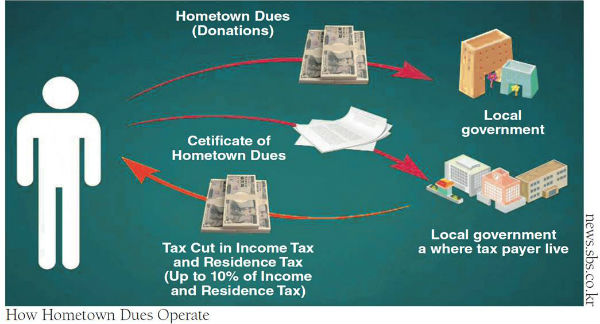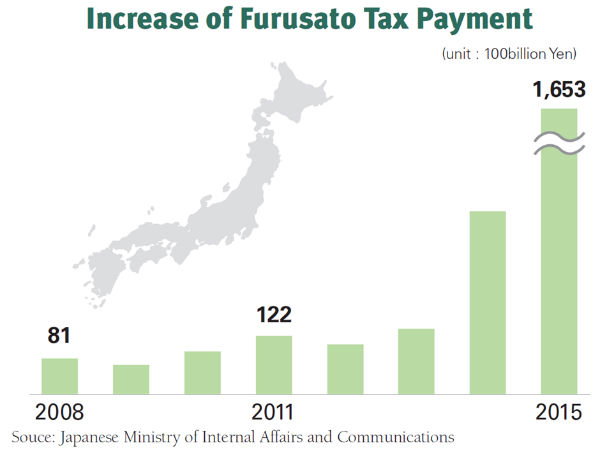Seoul, the capital of Korea, is where half of the entire Korean population is concentrated. The high population density has been increased by the populations who moved from the countryside to Seoul. Not only has the move of population increased the tax revenue of the capital area administration, but it has also negatively affected the finances of local governments. To cope with the problem that they are facing, in the 20th regular session of the National Assembly, local governments are making an effort to legislate the “hometown dues.” The Sungkyun Times (SKT) examines the concept of hometown dues, looks into the Furusato tax payment that was successfully implemented in Japan, and checks the prospect of hometown dues which may be implemented in Korea.
What are hometown dues?
Hometown dues are a type of tax payment system which can subsidize local governments. People who want to pay the hometown dues should select one local government that they want to support. After choosing one local area, ten percent of the income tax that people paid to the region would be passed to the local government as a type of donation. Among many different types of taxes, income tax is directly related to the central government tax revenue and its distribution. This does not mean that the payers should pay income tax and hometown dues separately. Hometown dues are included in the income tax, and whether the ten percent income tax is to be used as hometown dues or not is optional to the payers. As the hometown dues operate as a contribution to a local community, the people in the local community give their local specialties in return. The central government also gives them a deduction in the following year’s income tax.

Background of Hometown Dues
The 20th National Assembly session is not the first time that the hometown dues issue was brought to the surface. The discussion about hometown dues started from the 18th National Assembly. It, however, received less support due to the concern that the tax revenue of the central government would be reduced. In addition, the hometown dues bill was proposed in a way where people could only pay hometown dues to the town that they came from. Only being allowed to contribute to their hometowns led to controversies relating to regional difference, feeling of regionalism, and in the end, the bill failed to pass in the National Assembly.
The emergence of the discussion about a new type of hometown dues is attributed to several factors. First, the financial crisis in local governments raised the issue. In Korea, 30% of local governments cannot sustain themselves due to a lack of tax revenues. The financial crisis of local governments is so severe that they are unable to make up for their most basic spending of paying their own employees. As such, while they need subsidiaries from the central government, the processes to obtain the subsidiaries are not easy for them. Compared to the local government, where the self-sufficiency level is only 11%, the fiscal self-resilient ratio of Seoul is over 80%.
In addition to this decreased self-sufficiency level of local governments, the burden on local governments is gradually increasing. The welfare fee which should be provided by the local government accounts to 26.1% of its budget in 2013, and the ratio exceeded 27% in 2014. This means that the burden for the local government is increasing constantly.
The third reason for its emergence is the high demand for a balanced development of the country. As a high population resides in Seoul, the tax revenues are mostly concentrated to the government of central areas, and this could eventually lead to decreased revenue for the development of other areas in Korea. Therefore, the amenities in local areas are difficult to organize with the same efficiency as those in the capital.
Specific Implementing Method
The newly devised hometown dues are different from previous hometown dues bills which failed in their proposal. Firstly, the hometown dues are implemented as a way of contribution. The previous hometown dues were only confined to people’s own hometowns. For example, a person from Busan living in Seoul could only contribute to Busan, his or her hometown. After the renewal of the law, however, not only can people choose to contribute to their hometown as donations, but they can also expand their option to other local areas.
Secondly, the deduction of the income tax payment is used as an incentive to participate in the hometown dues. This incentive can attain its goal of distributing the concentrated government tax, while tax payers also enjoy advantages in that they can receive a tax cut. Thus, this policy can be referred to as a win-win policy for both local governments and tax payers.
A final specialty in implementing hometown dues is that the local governments provide their local specialties in return. As local governments have to reward the tax payers of hometown dues, they are inevitably motivating local specialty markets to increase their supplies. This can eventually vitalize the local specialty market and make a virtuous cycle to boost the local economy.
Hometown Dues in Japan, the Furusato Tax Payment
The word the Furusato means “hometown” in Japanese, and the Furusato Tax Payment became a standard model for the Korean hometown dues.
Emergence of the Furusato Tax Payment in Japan
The Furusato Tax Payment first emerged in 2007 by the Japanese Prime Minister, Abe Shinzo, to reduce the gap between capital areas and non-capital areas, and was implemented in 2008. As mentioned above, the Furusato Tax Payers are required to pay up to 10% of their income or residential tax while obtaining tax cut for the next year. Payers are also able to obtain local specialties and rights for local shares, such as free pass coupons for hot springs in the region.

Current State and Characteristics of the Furusato Tax Payment
The Furusato Tax Payment is gradually increasing and its scale in Japan was ¥1,653 billion (about 1.8 trillion) in 2015. 40% of the total hometown tax revenue is used as purchasing gifts and 60% of the revenue is used for a financial support for local governments. Although the 40% of the Furusato Tax Payment seems unnecessary in that it is not used for financial support purposes, it can be spent on vitalizing local economy, because it is only used for buying local products. The Furusato Tax Payment in Japan also showed that it can increase the local competitiveness. As payers choose where to deliver their tax payment, local communities inevitably make an effort to develop their own characteristics and special local products to attract tax payers’ attention. Each of the local communities and governments are able to promote their own competitiveness through public relations. Finally, the most special characteristic of the Furusato Tax Payment is that it can function as donations for the needy, such as residents in disaster areas. In April 2016, there was a strong earthquake in Kumamoto prefecture in Kyushu. The earthquake was recorded at 7.0 magnitude earthquake, which is defined as the most dangerous level. The damage was so large and intensive that the local government of Kumamoto could hardly promote its specialties on the media. The Japanese, however, worked together to deal with the problems that Kumamoto faced and donated ¥2.28 billion (24.5 billion) in a month. The total amount was 24 times larger than previous month’s donations. Although Kumamoto was unable to give gifts in return, the overall cooperation to cope with the problem was meaningful.

Extension of the Furusato Tax Payment
The Furusato Tax Payment has been implemented for almost ten years and it is receiving a positive response from the public. This positive perception toward the policy resulted in the creation of an online website that compares all local communities and gifts. As the positive awareness increases, the Japanese government is expanding its area to corporations. The Furusato Tax Payment that is applied to corporation gives tax cuts to a company when a company contributes to an activity that can invigorate local communities. Although the gift is prohibited due to concerns of corruption, the Furusato Tax Payment implemented on corporations is also getting positive responses in that it encourages the social contribution of corporations.
Limitations and Possible Solutions
Remaining Flaws
Hometown dues still have limitations, and one of them is that they can lead to the competition among local governments. To make more people choose their local government, there is a possibility that competition will become too excessive. In Japan, a local community promoted that their reward would be iPhones or iPads. This was criticized as excessive competition and absurd advertisement that did not relate to their local characteristics. In addition, it would be possible for the richer to get richer and the poorer to get only poorer. This is due to the fact that the preference for local specialties and abilities in advertising are all different. Furthermore, compared to normal taxes, hometown dues are not a fixed revenue. The flexibility of revenue can affect the planning of the local government. Finally, in Korea, there are still local feelings that can lead to regional self-centeredness. Pervading with regionalism, Koreans tend to help people that they know rather than helping the needy. This increases the problem of choosing their own hometowns rather than to the people in need.
Possible Solutions
To reduce the excessive gift competition, the central government should make some guidelines for local governments to follow. Moreover, to reduce the polarized structure in the hometown dues system, the central government should provide non-monetary aid to help some local groups, such as those suffering from a lack of media power or who have difficulty finding their own characteristics. In addition, local governments should make their plan with the consideration of fixed spending. Finally, Koreans should abandon their regional self-centeredness to balance all the regions in the whole country.
According to the Economist, hometown dues are reported as one of the most successful policies of world. This can be an implication that the adoption of this policy in Korea would have positive effects as well. Hometown dues are a structural incentive that incite people to donate and help local governments grow in balanced way. The SKT hopes the hometown dues will be a starting point to eliminate all the discrepancies between the capital area and the non-capital areas.
